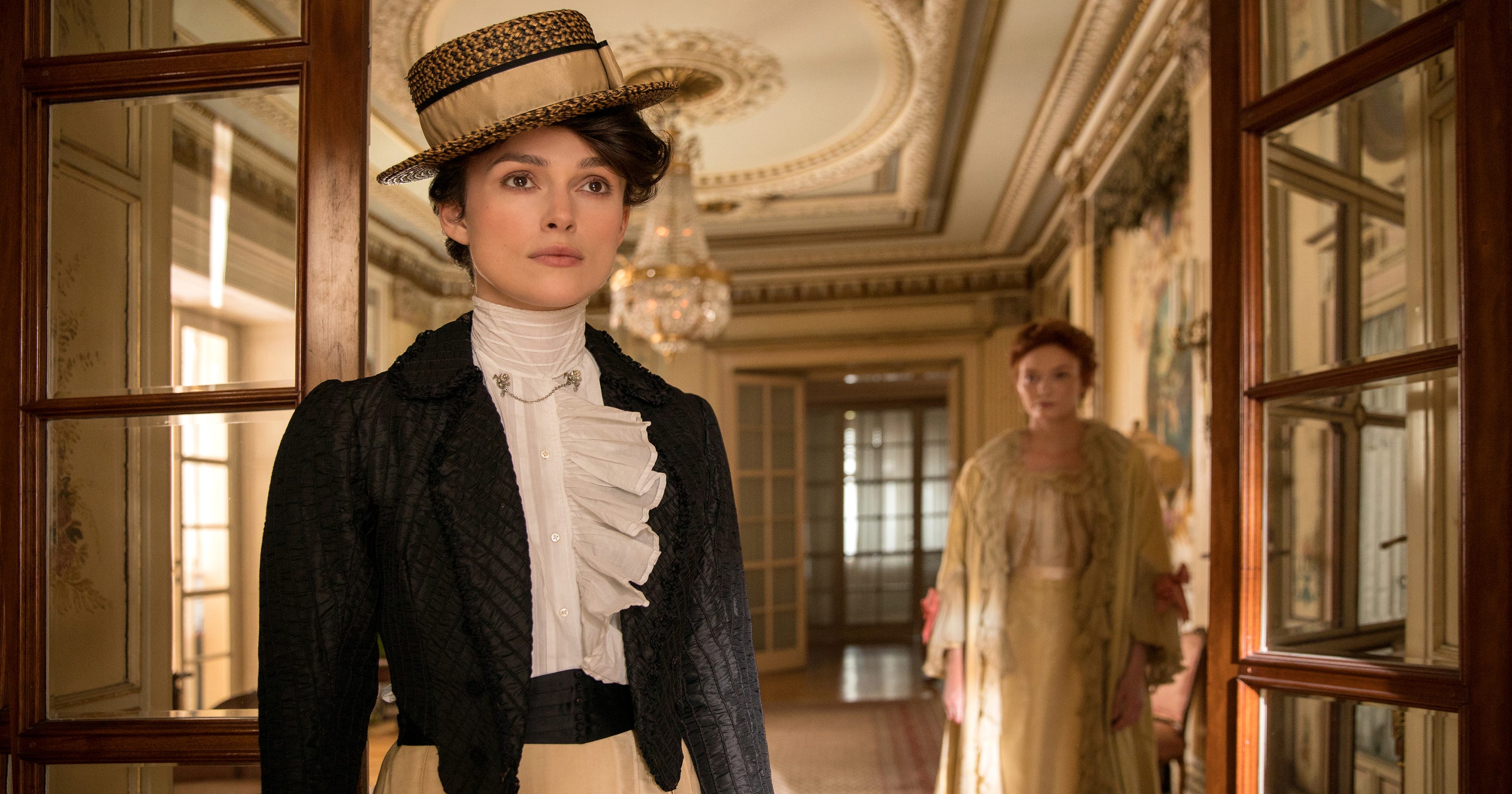Clearly, this is a bit of a moment as far as costume drama goes. The mad-as-a-box-of-badgers-and-rabbits The Favourite continues to attract audiences and awards voters alike; next week, we'll see a new version of the Mary, Queen of Scots story that reimagines 16th century court life along the lines of a Novara Media staff meeting. This week's Colette, Brit director Wash Westmoreland's biopic of the scandal-courting French creative, is similarly keen to revisit the past as a hotbed of free-thinking polysexuality and progressive feminism, but the advantage it has over its rivals is that such free thinking was evidently there all along in its subject's life, as in the art. Almost nothing has been imposed on the film; it's agreeably relaxed about both the film it is, and the film it wants to be, which - certainly in relation to The Favourite - is practically classical in its methods. Its drama and themes emerge from the interaction, sometimes conflict between characters who feel properly drawn, wayward, flesh-and-blood human beings rather than empty receptacles to be filled with virtue-signalling editorial. You'll have to wait only seven more days for those.
Westmoreland's film - conceived with the filmmaker's late partner Richard Glatzer, and co-written with the expert Rebecca Lenkiewicz (Ida, Disobedience) - charts a transitional moment in its subject's life. It opens in what we might call reassuringly heterosexual territory, with the young Sidonie-Gabrielle Colette (Keira Knightley) being plucked, daisy-like, from her country home by the roistering publishing sensation known simply as "Willy" (Dominic West), as much for her ability to knock out prose for his fiction shingle as for her eligibility as a bride and bedmate. They are a good match on some level, forever reaching for le mot juste, the perfect phrasing; the film honours its subjects by taking an evident delight in language - albeit the English language. Young bride tells opportunist hubby "I can read you like the top line of an optician's chart"; hubby expounds a (deeply wise) theory on why bad theatre is akin to dental surgery ("You're obliged to stay in your seat having your skull drilled until the whole grisly procedure is over"). They egg one another on to greater notoriety, but there was a peculiar wrinkle in their relationship, which Westmoreland makes the whole deal: Willy stole Colette's words away to publish under his own infamous name.
The story, then, becomes not just that of a young woman coming to find her own voice, but how the same woman came to repossess and truly own it, a process that involved escaping - if you will - the yoke of Willy, and plunging unabashedly into the throbbing heart of Gay Paree, embarking on flings with first the carefree American debutante Georgie Raoul-Duval (Eleanor Tomlinson), then crossdressing actress Missy (Denise Gough), returning after dark to her husband's bed. It's a ménage à trois/quatre/cinq with footnotes, in which all this literary power couple's previous certainties get flipped over and bent into new positions: their lovelives become the basis of their art, and that art becomes the primary means by which they communicate their innermost thoughts and desires to one another. When Colette tells Willy she's thinking of killing off the male hero of her Claudine series, we know immediately what she's really getting at, while spotting just how vampirically sharp the Knightley incisors can seem.
The sexual politics here aren't retconned, so much as lived among, thought about and worked through: it's a messy process, then as now, and for much of Colette's running time, it generates a rich and enjoyable strain of human comedy. Westmoreland fosters a casual, non-melodramatic performance style, far more 21st century than 19th. It'd doubtless be actionable to suggest West is playing a figure not unlike himself, but his farting, sharking man-about-town feels a good deal closer to our era than it does to the drably yellowing history books, and a more natural fit for the actor than all the B-movie scenery-chewing he's been up to in the wake of The Wire. Alongside - sometimes beneath - him, Knightley makes a transformation from gangly schoolgirl to angular style icon, pansexual pin-up and theatrical siren that feels like a small, fierce triumph for an actress now experienced enough to own her own star persona, and everything appealing within that. "Too much of my life has been arranged," she sighs at one point - and the line speaks not just to Colette's longing for new experience, but for a performer finally cut loose from that ghastly Pirates franchise.
I still slightly dread what Cahiers du Cinema is going to make of Colette, with its mock Moulin Rouge and its English actors writing in French (one of the film's fetish-pleasures: some lovely handwriting) while speaking in Estuary accents. It's a small regret that the marital tensions should be resolved in such a conventionally staged fashion: just this once, Washmoreland elects to address this couple's underlying issues of control, all the screwing around, as drama rather than bawdy boulevard farce. And he can't resist one clanging Biopic Eureka Moment - the Belle Époque equivalent of Kyle MacLachlan's Ray Manzarek doodling the "Light My Fire" riff in The Doors - as the young Colette scratches her first names out of an exercise book, only to pause before underlining her surname. Still, even that moment is worn as lightly and knowingly as any of Knightley's costume changes, and for every humdrum scene, there are four or five more that fizz and pop. It feels faintly unfair to rag on Mary, Queen of Scots before it's had the chance to open, but then you should be warned that film feels like homework forced upon us the day before the school holidays; Colette, both set against that and in its own gigglingly independent right, is purely and simply a romp.
Colette opens in cinemas nationwide today.

No comments:
Post a Comment